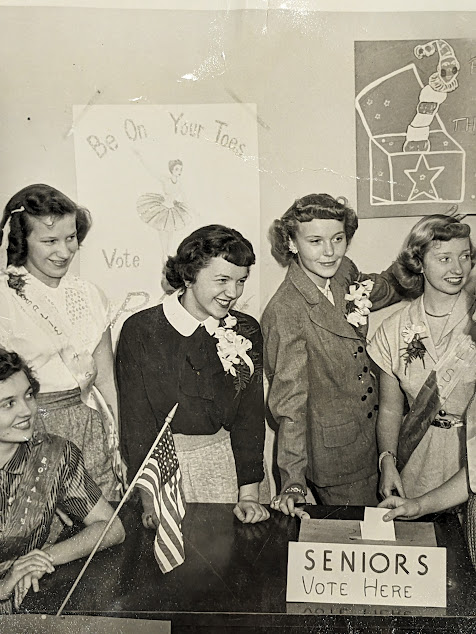“My name is Woman. So that you can know me from other women, I am called Rosalie Muschal-Reinhardt”1.
My Name is Woman, Personal Reflections
If you explore the Women and Leadership Archives and come across the finding aid for the Rosalie Muschal-Reinhardt Papers you will discover boxes of materials, including Box 1 Folder 9 Personal Reflections. Leafing through this folder you will the find reflections of teacher, mother, wife, activist, and religious leader Rosalie Muschal-Reinhardt, who dedicated her life towards, “the elimination of Sexism, Racism, Classism, Heterosexism and Ageism in our society”2. Born on June 23rd, 1933, Rosalie knew as a teenager that she wanted to be a teacher, a wife, and a mother. She achieved all of these goals and more.

In 1954, Rosalie earned her Bachelor of Science degree in Business Education from Rider University. She achieved her first goal through becoming a business teacher, and teaching Confraternity of Christian Doctrine classes, providing lessons on Catholicism to youth not attending Catholic school. In July of 1955 Rosalie married Alfred “Al” Reinhardt, writing that she fell in love with a man who was, “gentle, sensitive, and treated me with dignity”. Later, Rosalie was able to fulfill her final dream of being a mother, becoming pregnant with her first-born son Alfred. Overjoyed, Rosalie writes that she, “felt so connected with life, with God, with Al, with the universe”3 . She felt that her and Al were co-creating with God, bringing new life into the world. While the birth of Alfred brought Rosalie so much happiness, it also caused one of her first moments of dispute with the Catholic Church. Rosalie went to her local parish to arrange Alfred’s baptism, a sacrament of initiation into the Catholic Church. There she was told by a priest that she had to be churched. This was a practice in Catholicism to purify women postpartum, to give thanks for the safe delivery of her child, and was officially dropped in the 1960s after the Second Vatican Council. Rosalie was shocked and firmly told her priest no, “I was co-creating with God…I would not submit myself to something (that I was dirty) that was not true”4 . Rosalie would give birth to three more children, Erika, Kurt, and Michael. At the age of thirty she found that she had become everything she wanted to be. Yet, she yearned for more.
Continue reading